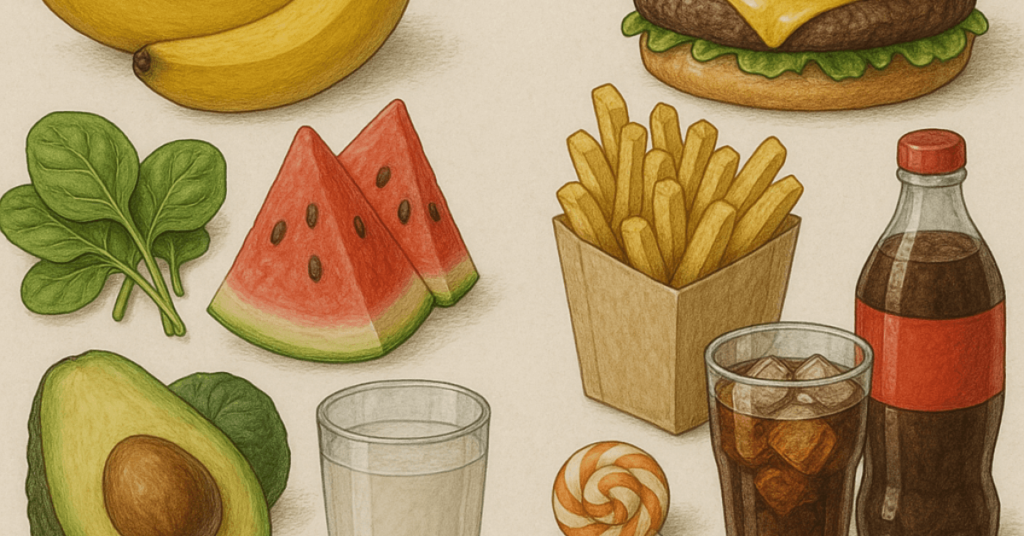Severe Leg Cramps at Night: Causes, Remedies, and Foods to Help. Few things are more disruptive to a good night’s rest than suddenly waking up with an intense leg cramp. These painful spasms, often felt in the calf or foot, can last anywhere from a few seconds to several minutes and leave lingering soreness afterward. Known as nocturnal leg cramps, they are common among adults and become more frequent with age.
In this article, we’ll explore what causes severe leg cramps at night, foods that can help or worsen them, nutritional deficiencies that play a role, and home remedies to find relief.

What Causes Severe Leg Cramps at Night?
Leg cramps happen when muscles contract involuntarily and do not relax quickly. At night, these cramps often occur because muscles and nerves become more sensitive when the body is at rest. Common causes include:
1. Dehydration
Muscles need proper fluid balance to contract and relax smoothly. When you’re dehydrated, electrolyte imbalances—especially in sodium, potassium, and magnesium—make cramps more likely.
2. Electrolyte Imbalances
Electrolytes are minerals that help transmit nerve signals and regulate muscle function. Deficiency in potassium, calcium, or magnesium can trigger nighttime cramps.
3. Poor Circulation
When blood flow to the legs is restricted, the muscles don’t receive enough oxygen, making them prone to cramping. Sitting or standing for long hours can worsen this.
4. Overuse of Muscles
Excessive exercise, prolonged standing, or sudden intense physical activity can lead to muscle fatigue. Fatigued muscles are more likely to cramp during rest.
5. Medication Side Effects
Certain drugs are linked to leg cramps, including:
- Diuretics (used for high blood pressure)
- Statins (cholesterol-lowering drugs)
- Beta-blockers
- Some asthma medications
6. Underlying Health Conditions
Nighttime cramps can also be associated with medical issues such as:
- Diabetes
- Peripheral artery disease (PAD)
- Nerve disorders
- Thyroid imbalances
7. Sleeping Position
Pointing your toes downward while lying in bed shortens the calf muscles, making them more likely to spasm.
How to Stop Leg Cramps Immediately with Food
When a leg cramp strikes, stretching and massage are usually the fastest ways to stop it. But food can also play an important role in prevention and immediate relief. Certain foods provide quick sources of minerals that relax muscles.
1. Bananas
High in potassium, bananas help balance electrolytes and prevent muscle contractions. Eating one before bedtime may reduce cramps.
2. Oranges
Rich in both vitamin C and potassium, oranges help maintain fluid balance in muscles. A glass of orange juice can also work as a quick remedy.
3. Spinach
Packed with magnesium, spinach supports muscle relaxation. Adding spinach to dinner may help minimize nighttime spasms.
4. Avocados
A single avocado provides high amounts of magnesium and potassium, making it an excellent evening snack for cramp prevention.
5. Coconut Water
For fast relief, coconut water replenishes electrolytes and hydration at the same time.
What Foods Trigger Leg Cramps?
While some foods help relax muscles, others may worsen cramps by dehydrating the body or robbing it of minerals.
1. High-Sodium Foods
Too much salt can cause fluid imbalances, increasing cramp risk. Processed snacks, canned soups, and fast food are common culprits.
2. Sugary Drinks and Sweets
Excess sugar spikes insulin, which can lower potassium levels in the blood, leading to cramps.
3. Caffeine and Alcohol
Both are diuretics, meaning they increase fluid loss and can cause dehydration. Drinking coffee or alcohol in the evening may increase the likelihood of cramps at night.
4. Highly Processed Foods
Foods low in nutrients but high in additives don’t provide the minerals muscles need, making them more prone to spasms.
Which Fruit is Best for Leg Cramps?
Several fruits can reduce leg cramps, but bananas stand out as one of the best. Here’s why:
- Bananas: Rich in potassium, which prevents muscle contractions. They also provide magnesium and vitamin B6, both important for nerve and muscle function.
- Oranges: Contain potassium and hydration-boosting fluids.
- Cherries: Reduce inflammation and muscle soreness, especially after exercise.
- Watermelon: Provides hydration plus magnesium and potassium.
If you want the best all-around fruit for leg cramps, bananas are the top choice, but combining them with hydrating fruits like watermelon gives added benefit.
Severe leg cramps at night after exercise.
Severe leg cramps at night after exercise are a common yet distressing issue for many people. These painful, involuntary muscle contractions often occur in the calves, hamstrings, or feet, and can last from a few seconds to several minutes.
One major cause is muscle fatigue combined with dehydration or electrolyte imbalance, particularly low levels of potassium, magnesium, or calcium. Intense or prolonged exercise, especially if the muscles are not properly stretched, increases the risk.
Poor circulation or sleeping positions that restrict blood flow can also trigger cramps at night. To prevent them, it’s important to stay well-hydrated, replenish electrolytes through balanced nutrition, and include stretching or gentle cooldown exercises after workouts.
Massage, applying heat, or slowly stretching the cramped muscle can bring quick relief. If cramps become frequent or severe, it may signal an underlying condition such as nerve compression or circulatory issues, and consulting a healthcare professional is advisable.
What Deficiency Causes Leg Cramps at Night?
The most common deficiencies linked to nighttime leg cramps include:
1. Magnesium Deficiency
Magnesium is essential for muscle relaxation. Low magnesium levels lead to muscle twitching, spasms, and cramps.
2. Potassium Deficiency (Hypokalemia)
Potassium regulates nerve impulses and muscle contractions. Without enough potassium, the risk of cramps increases significantly.
3. Calcium Deficiency
Calcium is necessary for proper muscle contraction and relaxation. Low calcium levels can make muscles overactive, leading to cramping.
4. Vitamin D Deficiency
Vitamin D helps the body absorb calcium. Without it, calcium levels drop, which may cause cramps.
5. B-Vitamin Deficiencies
B vitamins, especially B12 and B6, support nerve health. Deficiency can cause nerve-related cramps and tingling sensations at night.
What is the Best Home Remedy for Leg Cramps at Night?
If you wake up with a painful cramp, here are the most effective home remedies for quick relief and prevention:
1. Stretching
The fastest way to relieve a cramp is to stretch the affected muscle:
- For calf cramps: Stand up, place your weight on the cramped leg, and gently bend the knee.
- Alternatively, pull your toes toward your shin while sitting or lying down.
2. Massage
Firmly massaging the muscle with your hands or a foam roller helps release tension and improves blood flow.
3. Heat Therapy
Apply a warm compress or heating pad to the cramped muscle. Heat relaxes tight muscles and reduces pain.
4. Cold Therapy
If soreness lingers after a cramp, apply an ice pack to reduce inflammation.
5. Hydration with Electrolytes
Drink water with added electrolytes, such as coconut water or an electrolyte drink, to restore balance quickly.
6. Epsom Salt Bath
Epsom salts contain magnesium sulfate. Soaking in a warm bath allows magnesium to absorb through the skin, relaxing muscles.
7. Apple Cider Vinegar
Some people find relief by drinking a tablespoon of apple cider vinegar mixed in warm water. It contains potassium and may restore mineral balance.
8. Magnesium Oil
Topical magnesium oil massaged into the calves before bedtime can reduce cramps.
Preventing Nighttime Leg Cramps
Beyond remedies, prevention is key. Here are lifestyle tips to reduce nighttime cramping:
- Stay hydrated throughout the day.
- Stretch before bed, especially calves and hamstrings.
- Wear comfortable shoes with good arch support.
- Avoid excess alcohol or caffeine in the evening.
- Eat a mineral-rich diet, including bananas, leafy greens, nuts, and whole grains.
Final Thoughts
Severe leg cramps at night can be painful and frustrating, but understanding their causes and solutions makes them easier to manage. Dehydration, poor circulation, nutrient deficiencies, and certain lifestyle habits all play a role. While bananas, spinach, avocados, and coconut water can help stop or prevent cramps, avoiding processed and dehydrating foods is just as important.
If cramps are frequent, persistent, or accompanied by other symptoms such as numbness or swelling, it’s best to consult a healthcare provider to rule out underlying conditions.
By combining nutrient-rich foods, hydration, stretching, and home remedies, you can reduce nighttime leg cramps and finally enjoy more restful sleep.

